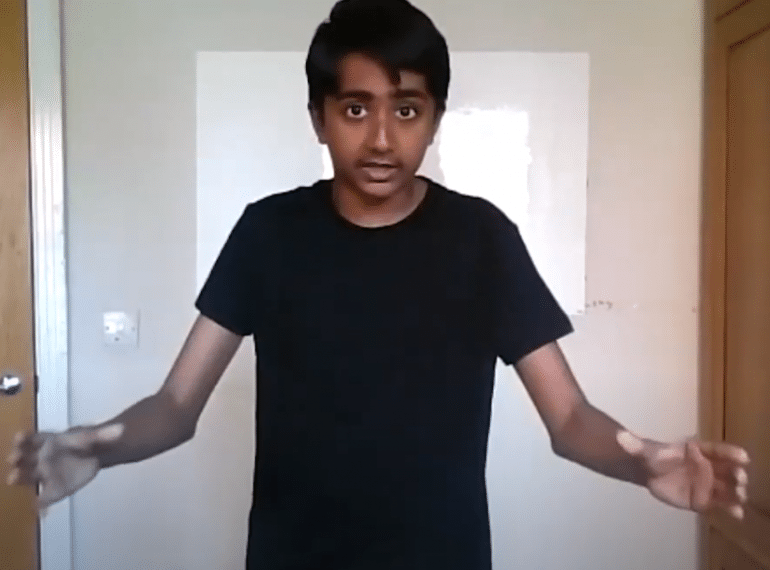
QE pupil Adithya Raghuraman has been declared the national joint winner of a prestigious Shakespeare performance competition – after live-streaming his entry from his bedroom.
Adithya impressed judges with his animated rendering of Brutus’s speech from the play, Julius Caesar, in which the orator and conspirator seeks to justify the assassination of the eponymous Roman dictator to the populace with the famous lines “…not that I loved Caesar less, but that I loved Rome more”.
Adithya made his inspired performance in the Grand Final of the English-Speaking Union’s Performing Shakespeare competition despite his plans being thrown into disarray when he, along with a number of his peers in Year 8, was sent home to self-isolate following a classmate’s positive lateral flow test.
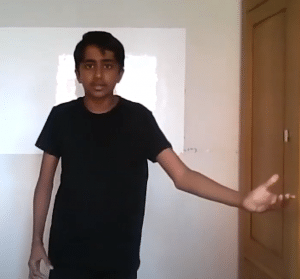 Head of English Robert Hyland said: “His joint-victory is fully deserved, and a credit to all the hard work he has put in. Adithya is in my English class, so when I saw his preliminary performance, I knew we were looking at something good; in the preliminary round in December, he was the only student to score full marks – and that in a top-set English class. However, I don’t think we recognised then how good his performance was!
Head of English Robert Hyland said: “His joint-victory is fully deserved, and a credit to all the hard work he has put in. Adithya is in my English class, so when I saw his preliminary performance, I knew we were looking at something good; in the preliminary round in December, he was the only student to score full marks – and that in a top-set English class. However, I don’t think we recognised then how good his performance was!
“In the Grand Final, in the face of considerable adversity, he showed maturity well beyond his years by delivering with real aplomb a demanding speech that combines high emotion with a strong appeal to reason. Performing in his room with no other audience than the computer in front of him, Adithya still made it feel like he was addressing the masses.”
In November 2020, all 192 Year 8 pupils at QE were asked to learn a Shakespeare speech by heart to perform in the classroom. They could choose any speech from all of Shakespeare’s 37 works. Speeches from Othello were popular choices – as a play pupils were studying at the time – and many of Shakespeare’s most famous monologues and soliloquies were performed, including Jaques’ “All the world’s a stage” from As You Like It, Macbeth‘s “Is this is a dagger that I see before me?”, and Hamlet‘s “To be or not to be”.
Teachers judged them according to the ESU competition’s criteria. “Even at the preliminary stage, the standard of competition was very high,” said Mr Hyland. “Remembering 25-30 lines of Shakespeare is in itself a powerful test of memory, but the idea of having to interpret it for the purpose of performance, and have the confidence to deliver it in front of your peers, is especially challenging. It is to the credit of the whole year group that they were able to rise to the challenge so successfully. This preparation was done without direction from teachers, or classroom rehearsal time, and the boys had full autonomy over their choices.”
The 12 best performers in the year were asked to record themselves delivering their speeches, and the top three videos were subsequently sent to the ESU for judging. “We were delighted that Ash Iyer received a judges’ commendation, and that Adithya was announced as a finalist – one of only two in London, and one of 22 from Years 7-9 in schools across the UK.”
The victory in the final was “reflective of Adithya’s wider ability in English, not only as a young man who has an extraordinary ability to infer meaning from challenging texts, but one who is able to communicate it through an almost flawless artistic expression,” said Mr Hyland. “He is a model for other students, both in his own year group, and in future year groups, of the standard that is possible.”
Adithya began his four-minute video submission by speaking of his enthusiasm for the “thrilling nature” of the play. He explained why he chose Brutus’s speech, rather than the still-more-famous monologue (“overvalued in my opinion”) of Mark Antony, which begins “Friends, Romans, countrymen, lend me your ears” and which follows immediately afterwards in the script.
Adithya said: “Brutus, who is one of Caesar’s dearest friends, is partly attempting to repair his reputation with the public and, I must say, he delivers such a thoroughly convincing speech that he has partly persuaded me to take his side of the argument.”
Immediately after his performance of the speech, from Act 3, Scene 2, the Grand Final’s online Master of Ceremonies, Jenny Stone, said: “I am convinced by that eloquent introduction: I shall be joining ‘Team Brutus’ from now on….good, good choice!”
He impressed a panel of judges comprising both actors and Shakespeare experts, which was chaired by Baroness McIntosh of Hudnall, former executive director of the Royal National Theatre, board member of the Royal Shakespeare Company and Deputy Speaker of the House of Lords. Adithya received personalised feedback from one of them, Peter Kyle OBE (former CEO of Shakespeare’s Globe, and currently chair of Shakespeare’s Birth Trust). He was “very impressed by [Adithya’s] introduction, setting out the speech in the context of the play”. Adithya made clear what he was trying to achieve and – then went on to achieve – said Mr Kyle. And he was “very convincing in role”, particularly for his “physical focus and direction of intent”.
Reflecting later on his triumph, Adithya paid tribute to Mr Hyland for his support throughout and said: “I had not expected to even get a ‘highly commended’, so this was too good to be true. I was overwhelmed, and it took me a few hours to let it sink in.
“From the competition I benefitted in many ways; I came out a more confident speaker with new ideas under my belt and also with more knowledge of the greatest playwright of all time.”
He hopes to participate in drama at the School in the future and in further external events: “I would love to take part in more of these competitions, maybe in a group next time, as they are a lot of fun.”
Founded in 1918, the English-Speaking Union seeks to promote better communication between people of different cultures and countries.
Brutus’s speech
Romans, countrymen, and lovers! Hear me for my cause, and be silent that you may hear. Believe me for mine honour, and have respect to mine honour that you may believe. Censure me in your wisdom, and awake your senses that you may the better judge. If there be any in this assembly, any dear friend of Caesar’s, to him I say that Brutus’ love to Caesar was no less than his. If then that friend demand why Brutus rose against Caesar, this is my answer: not that I loved Caesar less, but that I loved Rome more.
Had you rather Caesar were living and die all slaves, than that Caesar were dead, to live all free men? As Caesar loved me, I weep for him. As he was fortunate, I rejoice at it. As he was valiant, I honour him. But, as he was ambitious, I slew him. There is tears for his love, joy for his fortune, honour for his valour, and death for his ambition. Who is here so base that would be a bondman? If any, speak—for him have I offended. Who is here so rude that would not be a Roman? If any, speak—for him have I offended. Who is here so vile that will not love his country? If any, speak—for him have I offended. I pause for a reply…
Then none have I offended. I have done no more to Caesar than you shall do to Brutus. The question of his death is enrolled in the Capitol. His glory not extenuated wherein he was worthy, nor his offenses enforced for which he suffered death.
[Enter Mark Antony with Caesar’s body]
Here comes his body, mourned by Mark Antony, who, though he had no hand in his death, shall receive the benefit of his dying—a place in the commonwealth—as which of you shall not? With this I depart: that, as I slew my best lover for the good of Rome, I have the same dagger for myself when it shall please my country to need my death.

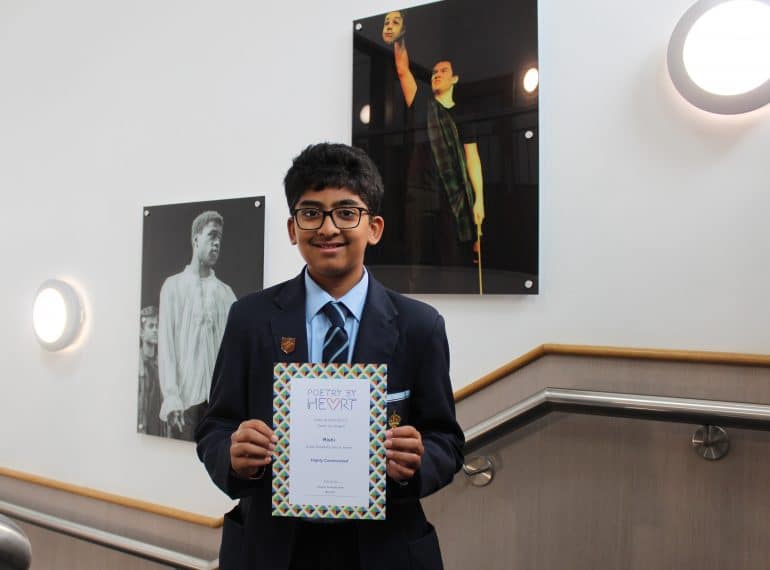
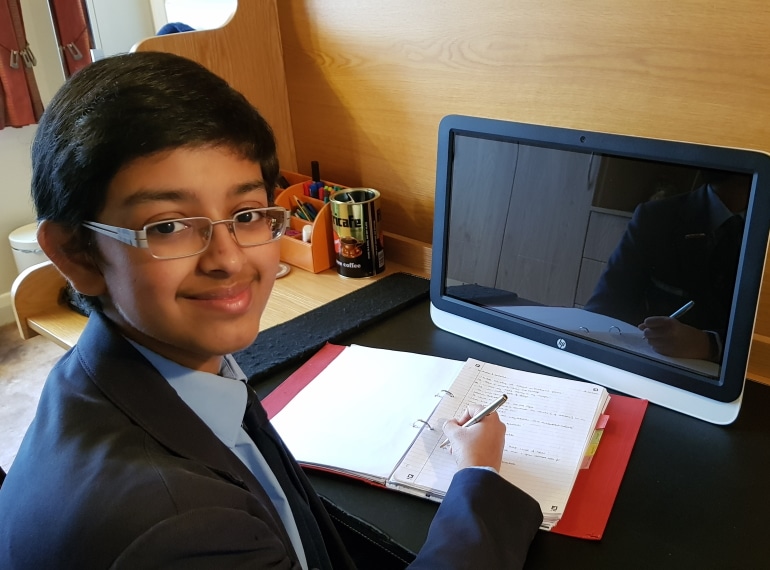
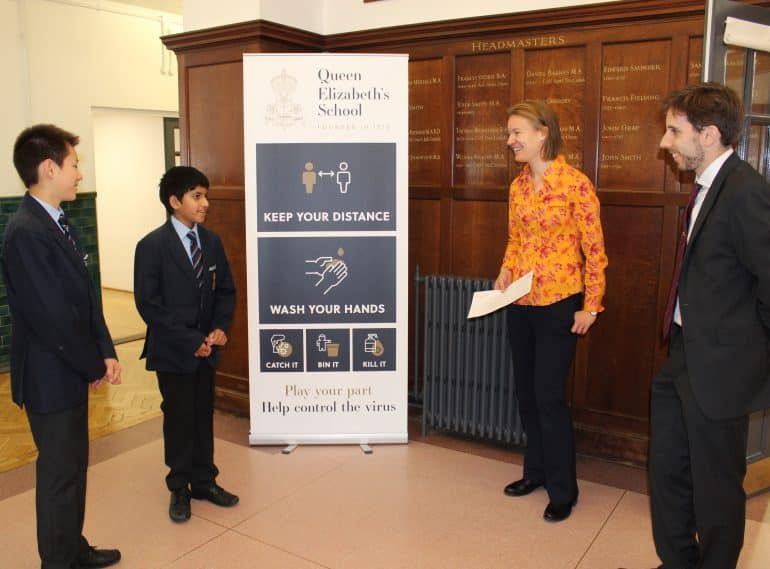
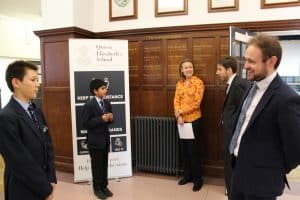 Staff from across the departments took part, showing pupils that poetry is enjoyed by teachers from all subject areas. Boy were invited to approach them during the day and ask them about their choices.
Staff from across the departments took part, showing pupils that poetry is enjoyed by teachers from all subject areas. Boy were invited to approach them during the day and ask them about their choices.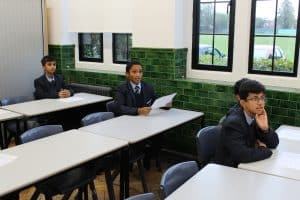 “The staff have nominated an incredibly wide-ranging selection, from poems that inspire, to poems that address problematic issues in the modern world. I’ve really enjoyed reading the selections which teachers have nominated.”
“The staff have nominated an incredibly wide-ranging selection, from poems that inspire, to poems that address problematic issues in the modern world. I’ve really enjoyed reading the selections which teachers have nominated.”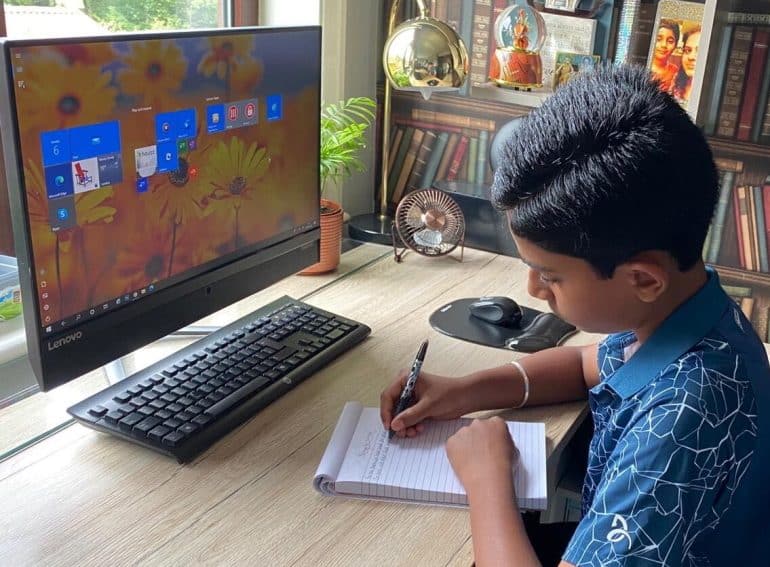
 Year 8 boy Surya’s poem, The Pathway to Triumph!, was selected to feature in an international collection of writing from the Young Writers organisation entitled Write To Unite – Together We Stand.
Year 8 boy Surya’s poem, The Pathway to Triumph!, was selected to feature in an international collection of writing from the Young Writers organisation entitled Write To Unite – Together We Stand.
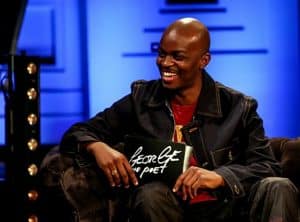 Anthony was quoted by the
Anthony was quoted by the 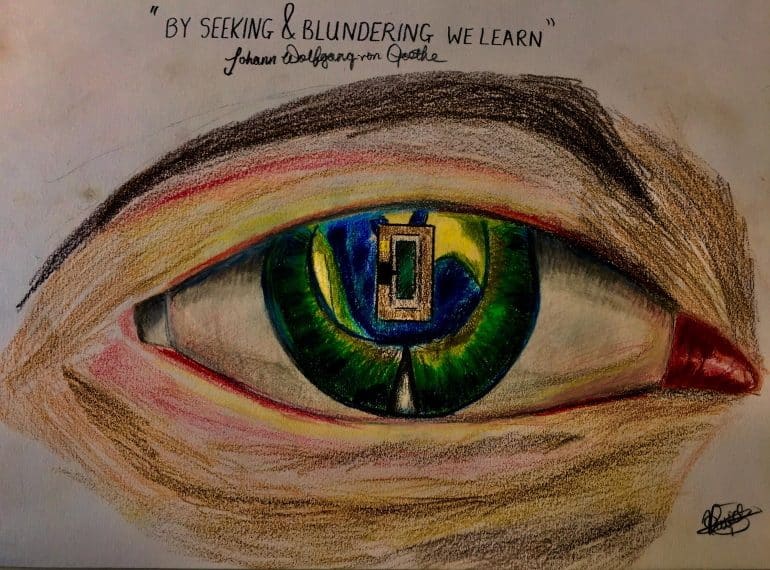
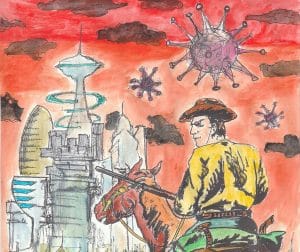 Under the theme, Brave New World, the Art and English departments launched Art and poetry competitions which attracted a high level and standard of entry, many of which are celebrated in the special release.
Under the theme, Brave New World, the Art and English departments launched Art and poetry competitions which attracted a high level and standard of entry, many of which are celebrated in the special release.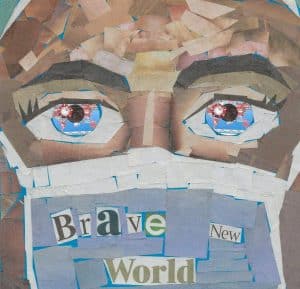 He ranked their entries on whether the image produced captured the spirit of the Brave New World title and on how it might work as a book jacket design. There were more than 60 entries, covering all the year groups.
He ranked their entries on whether the image produced captured the spirit of the Brave New World title and on how it might work as a book jacket design. There were more than 60 entries, covering all the year groups.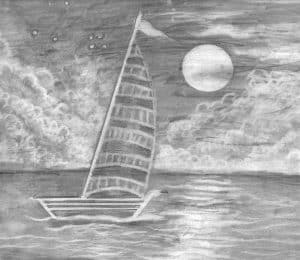 Alex, who was placed second, added: “I wanted to combine the past, present and future within one drawing. I chose to use a traditional, well-known, scene of a cowboy [pictured above right] overlooking a typical western setting of a desert, but replace it with a futuristic, almost dystopian, element with tall trees and an unknown distant city of skyscrapers. The large viruses that hang above the cowboy are obvious references to the current situation we live in.”
Alex, who was placed second, added: “I wanted to combine the past, present and future within one drawing. I chose to use a traditional, well-known, scene of a cowboy [pictured above right] overlooking a typical western setting of a desert, but replace it with a futuristic, almost dystopian, element with tall trees and an unknown distant city of skyscrapers. The large viruses that hang above the cowboy are obvious references to the current situation we live in.”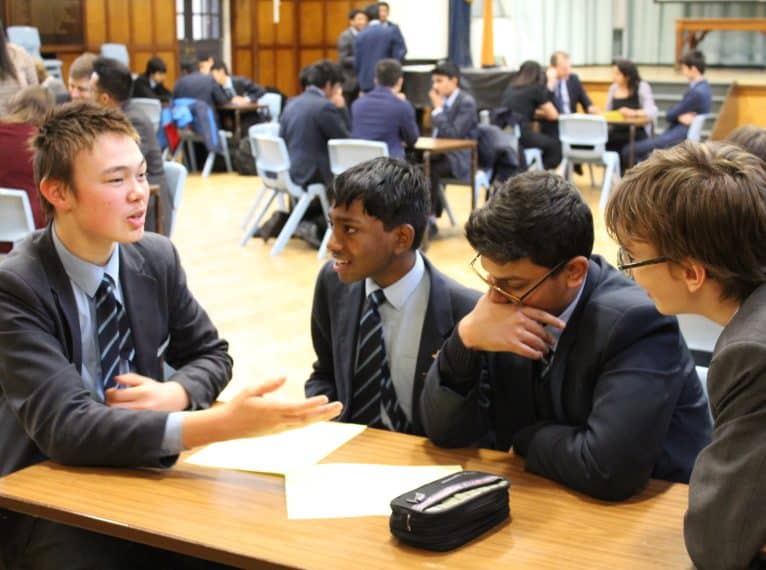
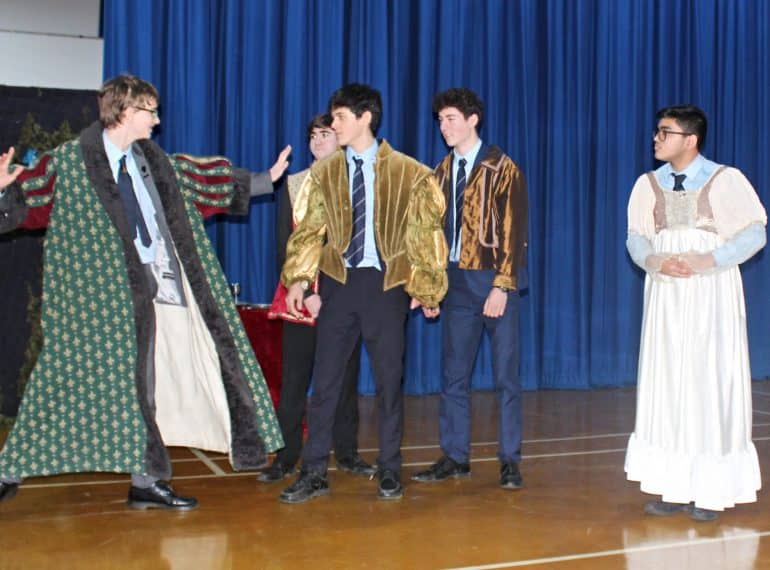
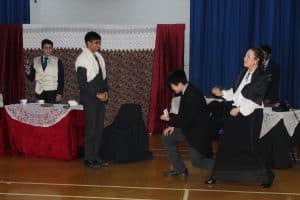 Head of English Robert Hyland said: “The majority of time in class has been spent looking closely at the linguistic and thematic features of the texts in a purely literary context. It is really important for the boys to be able to appreciate how the literary foundation of the classroom translates into the dramatic sphere of performance if they are to maximize their understanding of the texts.”
Head of English Robert Hyland said: “The majority of time in class has been spent looking closely at the linguistic and thematic features of the texts in a purely literary context. It is really important for the boys to be able to appreciate how the literary foundation of the classroom translates into the dramatic sphere of performance if they are to maximize their understanding of the texts.”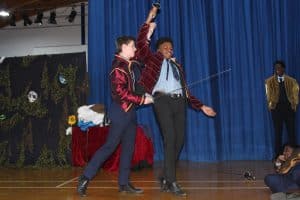 For Romeo and Juliet, an interactive staging in costume of the Capulet Ball (Act 1, Scene 5) and of the sword fight between Romeo, Mercutio and Tybalt (Act 3, Scene 1) helped show Romeo’s progression through the text, proving popular with the boys.
For Romeo and Juliet, an interactive staging in costume of the Capulet Ball (Act 1, Scene 5) and of the sword fight between Romeo, Mercutio and Tybalt (Act 3, Scene 1) helped show Romeo’s progression through the text, proving popular with the boys.